|
|
|
Sort Order |
|
|
|
Items / Page
|
|
|
|
|
|
|
| Srl | Item |
| 1 |
ID:
055072


|
|
|
| 2 |
ID:
180143
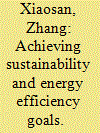

|
|
|
|
|
| Summary/Abstract |
This study examines the relationship between total renewable electricity generation, total hydroelectric generation, and carbon dioxide emissions (CO2e) for China. The autoregressive distributed lag (ARDL) model showed that renewable electricity generation, hydroelectric generation, and green innovation decreased CO2e in China from 1990 to 2018, whereas gross domestic product per capita and foreign direct investment increased CO2e. Moreover, the Granger-causality test results are as follows. First, a two-way causal flow from CO2e to foreign direct investment and CO2e to gross domestic product per capita confirmed the feedback hypothesis. Second, a one-way causal flow from hydroelectric and renewable electricity generation to gross domestic product per capita supported the energy-led growth hypothesis. Third, the causality test reflected a one-way causal flow from renewable electricity generation to foreign direct investment and hydroelectric generation to foreign direct investment and renewable electricity generation. This study asserts the need for government to introduce taxes and other incentives for solar, wind, and hydropower-related projects. The paper also calls for designing policies to improve the market attractiveness of hydroelectric generation projects through special investment programs.
|
|
|
|
|
|
|
|
|
|
|
|
|
|
|
|
| 3 |
ID:
120672
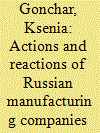

|
|
|
|
|
| Publication |
2013.
|
| Summary/Abstract |
This essay explores the nature of the 2008 crisis and the channels through which it affected the performance of firms in Russia. Based on the findings of a manufacturing industry survey, the evidence suggests that all manufacturing firms were affected by the crisis and that there is no single and dominant transmission channel. Crisis reactions were significantly related to participation in international markets, although participation in trade, in external borrowing or FDI cannot explain recession by themselves. The reversal of growth was mainly caused by demand shock and, following that, by financial constraints. Thus the hypothesis that blames overheating of internal demand in the years prior to the crisis seems to receive statistical backing. Globalised companies, though hit by external shocks, were better prepared to pay the cost and balance the consequences of the crisis.
|
|
|
|
|
|
|
|
|
|
|
|
|
|
|
|
| 4 |
ID:
107222
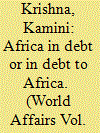

|
|
|
| 5 |
ID:
090811
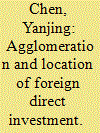

|
|
|
|
|
| Publication |
2009.
|
| Summary/Abstract |
This paper investigates the effect of agglomeration on foreign direct investment (FDI) location in China. We use different measures of agglomeration, and test both within and across region agglomeration effect. The results suggest that urbanization, foreign-specific agglomeration and industry diversity have positive impact on FDI location. Urbanization, foreign-specific agglomeration and industry specialization, also significantly promote industrial FDI. The results also suggest there exist both within and across region agglomeration effects. Other factors including market size, wage, education, road density, government policy and trade cost also have significant impacts on FDI location.
|
|
|
|
|
|
|
|
|
|
|
|
|
|
|
|
| 6 |
ID:
117802
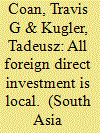

|
|
|
|
|
| Publication |
2012.
|
| Summary/Abstract |
This study focuses on the differences between Indian states in terms of banking infrastructure, size of the economic market and most importantly provincial-level political capacity that creates the pull of foreign direct investment (FDI). While the majority of the extant empirical literature examines national-level data, few studies analyze international capital formation at the provincial level and the dynamics of sub-national political capacity-that is, where allocations are made and policies are implemented. This study corrects for this deficiency. Using data at the provincial level in India over the period 2000-2005, we find an inverted-U-shaped relationship between provincial capacity and FDI, suggesting the presence of a critical point at which additional extractive capabilities have negative implications for foreign capital accumulation. The results suggest a number of important policy implications, allowing researchers to identify specific regions in which capacity is likely to facilitate investment, while also providing a political-economic model to better-forecast changes in investment at the sub-national level in India.
|
|
|
|
|
|
|
|
|
|
|
|
|
|
|
|
| 7 |
ID:
062467
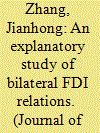

|
|
|
| 8 |
ID:
186491
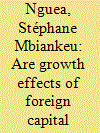

|
|
|
|
|
| Summary/Abstract |
Sub-Saharan Africa's electrification rate of 45% in 2018 remains extremely low compared with other developing regions. This study investigates if foreign capital could significantly contribute to enhancing the electricity access rate in Africa, a subject so far neglected in the literature. Specifically, it seeks to know whether increasing FDI, remittances and foreign aid matter for access to electricity in Africa. We utilize a dynamic panel System-Generalized Method of Moments (Sys-GMM) estimator to analyse data collected on a panel of 36 African countries over 2000–2017. The empirical findings show that FDI and remittances are positively and significantly related to increasing access to electricity. Moreover, our results show that foreign aid reduces the electricity access. We finally find that remittances reduce urban-rural disparities in access to electricity, while FDI and foreign aid increase disparities. These results remain consistent when we perform sub-regional analyses, suggesting that African countries should rely more on remittances and FDI to promote universal access to electricity.
|
|
|
|
|
|
|
|
|
|
|
|
|
|
|
|
| 9 |
ID:
163302


|
|
|
|
|
| Summary/Abstract |
Currently, there is no systematic evidence showing that, 15 years or more after entry, all multinational retailers provide lower prices than domestic buying groups. In the short term, some multinational retailers may lower prices to deter local competitors and attract consumers in a ‘loss leader’ strategy. However, domestic competitors can integrate buying groups to share the benefit of economies of scale with multinational retailers, while holding lower profitability requirements and overhead costs than multinational retailers. We compared multinational retailers to domestic buying groups in a jurisdiction that had one of the highest proportions of Walgreens and Walmart stores in the world. Despite their market power, in our representative samples of goods, there is no evidence that the prices of multinational retailers in the sectors of pharmacies, supermarkets and hardware stores are lower than domestic chains.
|
|
|
|
|
|
|
|
|
|
|
|
|
|
|
|
| 10 |
ID:
164532
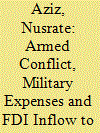

|
|
|
|
|
| Summary/Abstract |
This paper investigates the relationship between military expenditure and FDI inflow conditioning on the exposure of a country to armed conflict in the long run. We apply the band spectrum regression estimator, and the maximal overlap discrete wavelet transform, to a panel of 60 developing countries, for the years 1990 to 2013. The estimated results indicate that military expenditure, in the absence of armed conflict, reduces FDI inflow. However, the negative effect is mitigated by increased military expenditure, in the presence of armed conflict. We also show that the effect of military expenditure on FDI is time sensitive, in that it takes time for military expenditure to affect FDI inflow. FDI inflow in response to higher military expenditure is higher for the country that faces higher armed conflict than the country that faces lower armed conflict. The findings are robust in the case of overall as well as internal conflict. These results are also robust to the alternative specification, subsample analysis with different armed conflict thresholds, and the estimation using the time variant long-run models.
|
|
|
|
|
|
|
|
|
|
|
|
|
|
|
|
| 11 |
ID:
158547
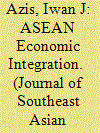

|
|
|
|
|
| Summary/Abstract |
Over the past five decades, the Association of Southeast Asian Nations (ASEAN) has made tremendous economic progress. While the continuous improvements in the region’s macroeconomic indicators might give the impression that this growth trend can be sustained smoothly in the long run, that might not necessarily be the case. In this paper, three imminent challenges are discussed — changing patterns of investment, slowing productivity, and the China factor. For the Association to cope with these risks and forge new development paths, structural reforms within, and deeper integration between its member states are imperative.
|
|
|
|
|
|
|
|
|
|
|
|
|
|
|
|
| 12 |
ID:
134440
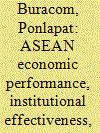

|
|
|
|
|
| Summary/Abstract |
Foreign direct investment (FDI) is considered to be one of the most important forces of economic growth and globalization. Many ASEAN economies have only a small domestic market; they are heavily reliant on international trade and FDI. Recent studies on cross-border investment indicate the importance of domestic economic performance and institutional effectiveness (including government effectiveness, regulatory quality, rule of law and property rights protection) in attracting FDI. The result from a cross-national empirical analysis, in this study, also confirms the significant impact of macroeconomic performance and institutional factors on FDI flows into developing countries. In this paper, it is argued that, with the exception of Singapore, most ASEAN countries are afflicted with relatively poor institutions for good governance, with low government effectiveness, and poor regulatory quality and rule of law. This relatively poor institutional quality may exacerbate the effects of external threats. As higher economic growth and better economic integration in other regions may divert FDI flows into ASEAN countries, their appropriate response is to improve institutional quality so that the share of FDI will increase in the total FDI inflows. Improving the institutional environment among ASEAN member countries should, therefore, be an important goal of ASEAN economic integration.
|
|
|
|
|
|
|
|
|
|
|
|
|
|
|
|
| 13 |
ID:
112999
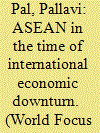

|
|
|
| 14 |
ID:
136060


|
|
|
|
|
| Summary/Abstract |
Like many other developing countries, South Asian nations have been experiencing increased foreign direct investment inflows over the past decade as developing countries get a larger share of cross-border investments that were once sent to developed countries. Nonetheless, South Asia’s inflows of foreign direct investment remain the lowest relative to gross domestic product among developing country regions. Why are South Asia’s foreign direct investment inflows so low and what lessons can be drawn for developing countries as a whole? The analysis in this article uses a novel empirical model that accounts for possible trends in convergence in the ratio of foreign direct investment to gross domestic product between countries and cross-sectional data for 78 countries from 2000 to 2011. The sample contains 52 developing countries. The analysis finds that two key factors are at work—high overall regulatory restrictions on foreign direct investment and specific restrictions placed on doing business with other countries. These factors include overall trade restrictiveness, which reduces the benefits to cross-border investments, and weak institutions to protect foreign investors and facilitate investment. Nonetheless, the potential for faster growth in intra- and inter-regional foreign direct investment flows is significant. The main factors leading to this conclusion are South Asia’s current low levels of foreign direct investment, the many unexploited opportunities for embodied knowledge transfer, and supply-chain linkages. The overall lessons for developing countries are that liberalizing policy constraints in both trade and foreign investment, keeping corporate tax rates modest, and improving governance and transparency could help to substantially improve foreign direct investment flows.
|
|
|
|
|
|
|
|
|
|
|
|
|
|
|
|
| 15 |
ID:
152186
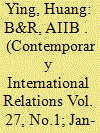

|
|
|
|
|
| Summary/Abstract |
Implementation of China’s Silk Road Economic Belt and 21st-Century Maritime Silk Road (B&R) initiative and the advent of Asian Infrastructure Investment Bank (AIIB) have redirected attention to infrastructure building in economic development. The domestically driven B&R policy is rewriting the geoeconomic and geopolitical map of Eurasia, while AIIB catalyzes a positive change in the dynamics of international development cooperation. They provide opportunities for South Asia which has economic potential but limited foreign investment inflow thus far.
|
|
|
|
|
|
|
|
|
|
|
|
|
|
|
|
| 16 |
ID:
187860
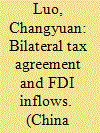

|
|
|
|
|
| Summary/Abstract |
This paper explains the changes in the composition of the source countries or regions of FDI in China from the perspective of taxation. Based on FDI data from 2003 to 2012, the empirical test, employing the difference-in-differences (DID) model, shows that, after the implementation of the tax agreement between the mainland and Hong Kong in 2007, FDI from Hong Kong increased significantly. After the integration of domestic and foreign-funded enterprise income tax systems in 2008, Hong Kong capital inflows increased even more drastically. The extended analyses show that, the substantial increase in Hong Kong capital after the implementation of this bilateral tax agreement was partly related to the diversion effect of investment. MNCs might have diverted investment from other tax havens to the mainland via Hong Kong, resulting in a sharp increase in the amount and proportion of Hong Kong investment, whereas those of FDI from other tax havens have declined.
|
|
|
|
|
|
|
|
|
|
|
|
|
|
|
|
| 17 |
ID:
150855


|
|
|
| 18 |
ID:
096960
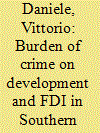

|
|
|
| 19 |
ID:
106472
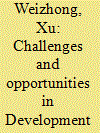

|
|
|
| 20 |
ID:
106998


|
|
|
|
|
| Publication |
DelhI, Dorling Kindersley, 2010.
|
| Description |
xiv, 188p.
|
| Standard Number |
9788131724118, hbk
|
|
|
|
|
|
|
|
|
|
|
|
Copies: C:1/I:0,R:0,Q:0
Circulation
| Accession# | Call# | Current Location | Status | Policy | Location |
| 054925 | 330.54051/GUR 054925 | Main | On Shelf | General | |
|
|
|
|
|
|
|
|
|